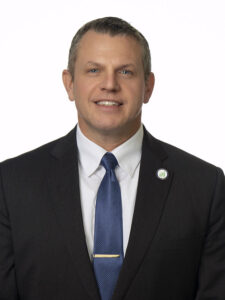
Jason E. Glass
I had the opportunity to speak at the annual Kentucky Educators Rising Conference at Bellarmine University in Louisville in March. Educators Rising is the career technical student organization for middle and high school students interested in education-related careers and the Educators Rising Conference is an annual gathering and showcase of Kentucky’s prospective teachers.
My talk focused on the current state of the teaching profession, acknowledging that we were experiencing larger than ever teacher turnover (teachers leaving their jobs at the end of the year), but that this also would create opportunities for these aspiring educators in the room.
I also wanted to share with them some hard-earned lessons about the teaching profession, things I wish someone had told me as I was considering teaching many years ago. I have the benefit of growing up in a family of educators and was able to bring that perspective to these young people. I also reached out to several teachers I know professionally and personally for their thoughts.
I pulled all of this together to create “10 Things I Wish Someone Had Told Me About the Teaching Profession.” Here is the list I presented to the Educators Rising attendees:
- Teaching is a lot of work. It is no 8 a.m.-3 p.m. job. It’s even more than an 8 a.m.-5 p.m. job. Teachers are typically at school early, before their students arrive. Then, after teaching all day, many teachers have after-school responsibilities, including building duties, clubs, after-school groups or coaching. Once that is finished, teachers typically need to spend extra time each evening preparing for the next day and catching up on correspondence they can’t get to during the school day (when they are teaching). Then the next morning, it starts all over again. It also isn’t a 9-month job. While teachers do get the benefit of some great time off to travel and be with their families, they also spend part of that time engaging in professional learning opportunities that will make them better and more effective teachers. It is not uncommon for teachers to spend what may be weeks of their summer vacation time in classrooms as students themselves, or taking part in some experience aimed at making them better teachers.
- Relationships matter most. In training programs to become teachers, there is rightfully a lot of focus on content (the subject matter they ultimately will teach) and pedagogy (the art and science of teaching and different teaching approaches and techniques). What typically isn’t as well covered – and what may be the most critical – is the importance of developing positive and supportive relationships with students. Students are the most willing to learn with teachers who they know care about them and who respect them. Aspiring teachers do need to spend a lot of time working on their content and pedagogy, but they also need to be thinking about how they can build authentic human connections with their students. One of the best ways to get respect from your students is to extend it to them first – don’t just demand it.
- Teaching is best with a team. Most students experience their teachers working solo – one teacher with their class. What students often do not see are the important team-based aspects of the job. Teachers often work together to plan, get feedback on lessons, get advice on challenging situations and to talk through the many tough issues they confront. These bonds between teachers are both professional and personal, and teachers often forge connections and friendships that last a lifetime. Teaching is a great and rewarding career, and it becomes even more so when it is experienced as a team.
- Smile a lot. Your students will be experiencing all sorts of challenges at home and at school in their lives. Some of these challenges you will know, but many others you will not. For your students, you may be the only person in a day who extends them some kindness.
- Working with difficult and challenging students will actually be the best part. One of the most gratifying aspects of teaching is helping a student overcome a real obstacle in their life, getting them to see something in themselves that they couldn’t before or positively changing a student’s future trajectory. This is all the sweeter when you connect with and support a student who has had to come through real challenges in their life. The effects of these challenges may manifest as anger or frustration with school and with teachers, but if you can persist in developing that trusted relationship with the student, you can be a person who truly makes a difference in the future of a young person when they need it most.
- Learning is not linear. We want to believe that we can sketch out some “scope and sequence” when it comes to the curriculum and that students will learn according to the timing in our pacing guides and unit plans. But learning doesn’t happen that way. While it is important to give some thought to timing and order, some students will surge ahead where others may need more time and support. Still others may struggle at first and then have a breakthrough in learning. While we need to be thoughtful about the ordering of content and student experiences, we also must recognize that we aren’t entirely at the wheel of control when it comes to the pace or manner of student learning.
- You can (and should) measure some things, but you can’t measure the most important things. Assessments are a vitally important tool for educators. We need to know if our students are “getting it,” who needs more help and if our instruction is effective. So the measures matter, but the things that matter most for students are much more difficult to measure. What are they most passionate about learning and doing? What talents might they have that could be developed into a career and life? Are they loved and cared for, and what do they love and care most about? These kinds of questions won’t show up on any standardized assessments, but they are the ones educators most desperately need to work to discover.
- Homework is not all that important. Sure, there are some things students can practice on their own time that will help them, but we need to be thoughtful about the homework we assign. The research on homework shows minor benefits for elementary students, which must be weighed against the opportunity costs of what experiences they might miss out on doing homework. While there is more evidence of benefit for middle and high school students, we (as educators) must be careful not to layer on the homework so students have hours of work after school – which can happen when different subject teachers are all adding on extra work.
- Take a long-distance runner approach to personal finance. No one goes into education with the goal of getting rich, but you can work yourself toward a stable middle class income and also save and plan for many years toward your eventual retirement. Be patient and make small and thoughtful moves when it comes to your finances. Work hard to stay out of and avoid debt – and that includes considering right now what you will pay to become trained as a teacher.
- Cherish the hum-drum, everyday part of the work. Spending time with the students each day is the best part of the job and you will get to do that on a daily basis. You never know when a student will make a breakthrough in their learning or when your act of kindness might be just what a student needs in that moment. It is these regular, ordinary, every-days with your students that you will look back on as your best days.


Leave A Comment